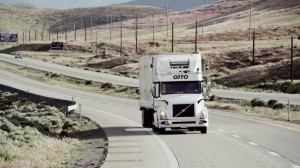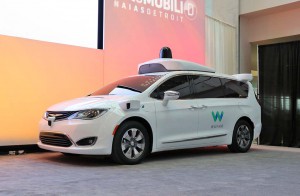A lawsuit filed by Waymo is taking a potentially nasty turn for Anthony Levandowski, a former Google employee who founded one of Uber’s self-driving vehicle units.
Waymo, the autonomous vehicle spin-off of Google, has gone to court claiming Uber stole some of its intellectual property, and the spotlight has fallen on Levandowski. He was a senior employee at Waymo before leaving to start his own self-driving enterprise, Otto, which focuses on autonomous trucking.
Called to testify, Levandowski invoked the Fifth Amendment and refused to testify, one of his attorneys saying that move was made because of “the potential for criminal action.” That appears to mean the potential Levandowski could be charged with stealing intellectual property.
But U.S. District Court Judge William Alsup wasn’t buying into that strategy, warning that, “If you think for a moment that I’m going to stay my hand because your guy is taking the Fifth Amendment, and not issue a preliminary injunction to shut down what happened here, you’re wrong.”
(Uber autonomous car crashes in Arizona. Click Here for the story.)
The lawsuit is one of the latest in a series of ongoing battles between tech giants alleging IP theft. In most cases, the focus is on civil claims, but there have been criminal prosecutions, as well.
Judge Alsup is a veteran of the IP wars, having overseen a particularly bitter battle between Google and Oracle. Other recent cases rocking Silicon Valley have included an epic battle over smartphone software pitting Apple and Samsung.
The Waymo-Uber suit is the biggest to date involving autonomous vehicle technology, though it is unlikely to be the last, according to industry observers.
Automakers, as well as suppliers and tech firms like Waymo, are spending billions of dollars to develop self-driving vehicles, with proponents promising to have the first on the road by the beginning of the next decade. Waymo has been widely hailed as one of the leaders in the field, but Uber has been pushing to build its own capabilities.
(Internal documents show problems with Uber’s autonomous vehicles. For more on that report, Click Here.)
CEO Travis Kalanick’s ultimate goal is fully driverless technology, and he has suggested that by eliminating the driver costs will drop to the point where it will be cheaper to use a ride-sharing service than owning a personal vehicle.
Uber has already established several pilot programs, in San Francisco, Pittsburgh and Phoenix (a crash last week forcing it to temporarily suspend its efforts). The ride-sharing giant has also been exploring ways to automate trucks. Proponents believe that will not only make roads safer but drive down delivery costs.
Otto last year demonstrated that potential with a well-publicized delivery of beer across Colorado. Uber subsequently purchased Otto last autumn for about $700 million.
But Waymo has accused Levandowski of basing Otto on technology he took with him when he left Waymo. The engineer-turned-entrepreneur allegedly took 14,000 documents with him when he left the Google spin-off. Waymo is now asking for injunctive relief that would prevent Uber – and Otto – from using that intellectual property. Such a court decision could effectively shut down Uber’s autonomous vehicle program.
In February, Uber derided the lawsuit as “a baseless attempt to slow down a competitor.” But it adds yet another decade for Kalanick and company. Uber has suffered a series of embarrassing setbacks in recent months, including the autonomous vehicle crash, a battle with California regulators over the San Francisco field test, allegations of sexual harassment and more.
Kalanick recently said he was searching for a new chief operating officer, but that move led to the resignation of the company’s president who had joined Uber only six months earlier.
(Uber hires former U.S. Attorney General to investigate harassment claims. Click Here for the story.)



